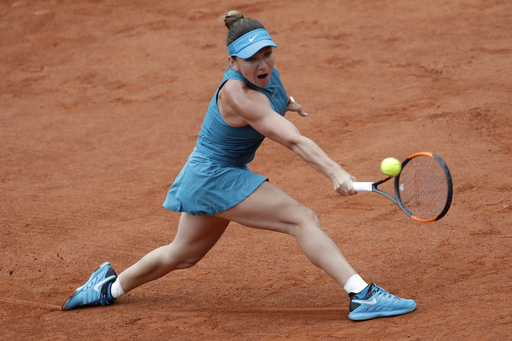Flying to Florida for the Miami Open, where she would be playing in a professional tennis match for the first time in 1 1/2 years after a doping ban was reduced on appeal, Simona Halep turned to her mother and offered a bit of a confession.
“I’m very nervous,” Halep, a two-time Grand Slam champion, recalled telling Mom.
She wasn’t sure what it would be like — on the court or off. And as she prepares to resume what she called her career’s “second part” during a video interview with The Associated Press from her home in Bucharest, Romania, Halep is more comfortable with her surroundings but not quite certain how close she can get to her old self as an athlete.
“I felt like I don’t know what to expect from people (in Miami). How it’s going to be — to be in the locker room again. Players’ dining (area). All this routine that I didn’t do for almost two years, it looked new for me,” said Halep, whose upcoming tournaments are next week in Oeiras, Portugal, and the week after that in Madrid.
“And when I arrived on-site, the love that I received from the people that are working for the tournament, the security, and all the people around, and also the players, helped me to just forget everything. And it felt like I never (was) away,” said the 32-year-old Halep, who has been working with new coach Carlos Martinez. “So it was a great feeling, a great energy, and I was really happy deep down that I am, again, part of tennis and part of this sport that I love. So for me, it was a great experience, much better than I expected. And this made me feel that, OK, now I want to go back and do my best and see how good I can be, still.”
Halep once was among the best in the world at what she does. She knew it. Everyone else did, too. The WTA rankings said so: Halep reached No. 1 in 2017 (she is No. 1,144 this week). As did her results: Halep was the runner-up at three major tournaments before breaking through by winning championships at the French Open in 2018 and at Wimbledon in 2019 (defeating Serena Williams in the final).
Now it’s harder for her to know what she’s capable of with a racket.
There’s the lack of matches, even if she was encouraged by the only one so far, a three-set loss to former No. 2 Paula Badosa in Miami on March 19. Questions about her fitness, a key component of her playing style. And while she worked while barred, it was not easy to find the motivation without knowing when — or, indeed, if — she’d compete again.
“It’s been a tough period. … It was difficult to manage, but now it’s a different story,” Halep said. “And I feel relief, I feel the freedom and” — here, she let out a laugh — “yeah, I am back in business.”
She thought her career might be finished when she was given a four-year penalty by the International Tennis Integrity Agency for testing positive for the banned blood-boosting drug Roxadustat at the 2022 U.S. Open, where she lost in the first round.
But the Court of Arbitration for Sport ruled in March that Halep’s test result was unintentional and caused by a contaminated supplement; the ban was reduced to nine months, longer than she already had been out of the sport, so she was allowed to enter events immediately.
“The WTA is very supportive of our anti-doping program and the process that it entails. It is an independent process we support — the findings that come from it — and so I’m very supportive of her return,” said Steve Simon, the head of the women’s tour. “I have not spoken with her directly yet or seen her, but I have sent her a note. It is great to have her back and I look forward to hopefully seeing Simona playing some great tennis.”
When Halep was barred — not just from playing but, as she noted, attending tournaments — she did not feel like watching much tennis on TV.
Who helped her get through the uncertainty? Family. A handful of friends. And some current and former players who offered support, a list she said includes Chris Evert, Kim Clijsters, Ash Barty, Angelique Kerber, Petra Kvitova and Carla Suarez Navarro.
The enjoyment Halep gets from competing is what pushes her now, more so than any particular goals.
Plus, she explained, it’s hard to know now what to aim for, both because of the lengthy absence and because, as Halep said, “I’m 32; I’m not that young anymore.”
She does aspire to find herself in the Top 10 once more.
“What I went through is not easy. So I cannot forget, like this,” she said, snapping her fingers, “just because I got cleared. There is baggage that probably will stay longer, and I cannot forget, like, one day (to the next) what happened. So I have to handle it better. I have to control my emotions coming back. So there is a (lot) that is not easy. But the joy, I hope, will help me.”
___
Howard Fendrich has been the AP’s tennis writer since 2002. Find his stories here: https://apnews.com/author/howard-fendrich
___
AP tennis: https://apnews.com/hub/tennis
This website uses cookies so that we can provide you with the best user experience possible. Cookie information is stored in your browser and performs functions such as recognising you when you return to our website and helping our team to understand which sections of the website you find most interesting and useful.
